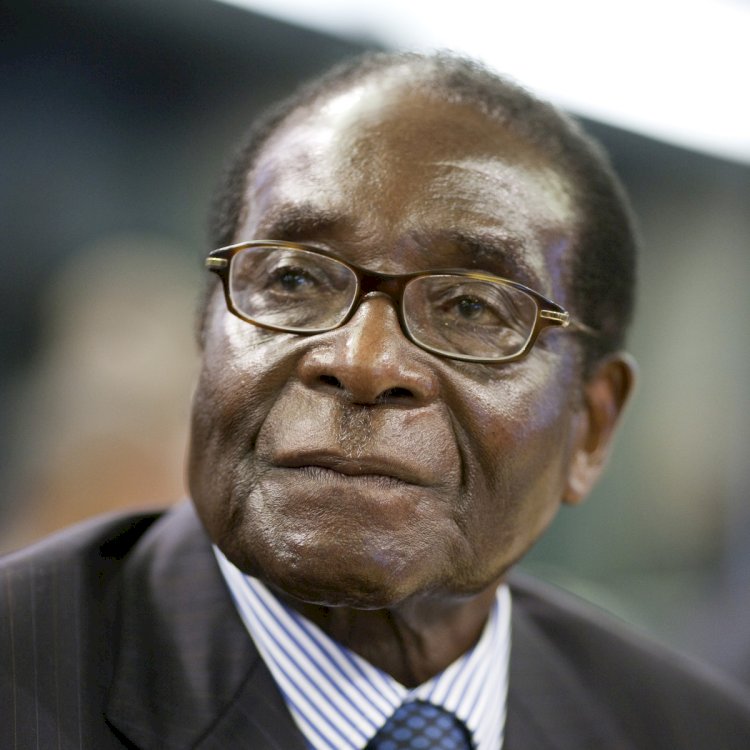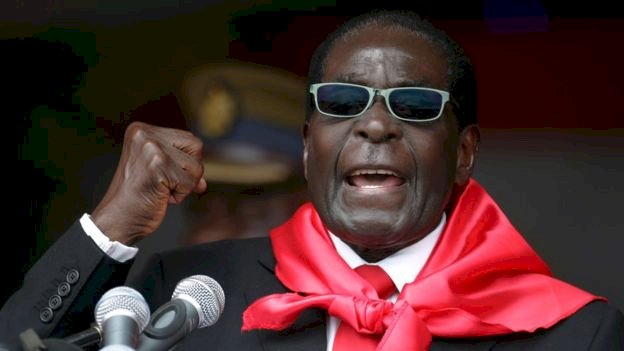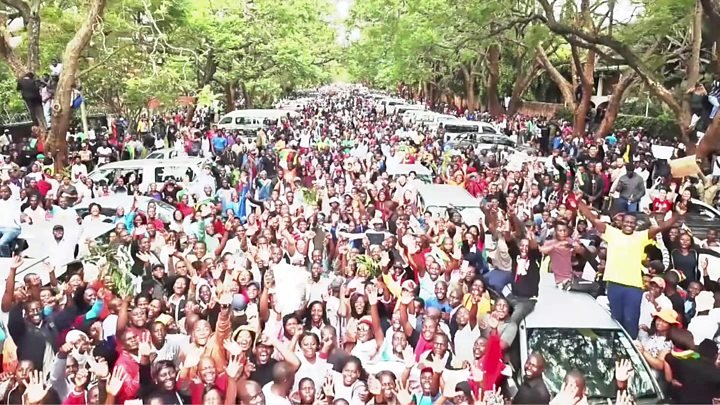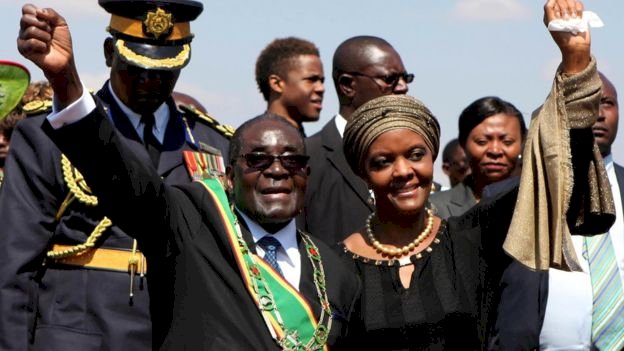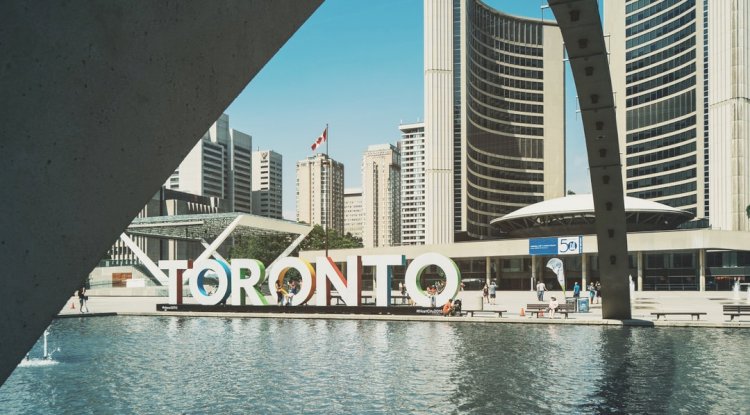ROBERT MUGABE: The Giant has fallen at 95
The former president was praised for broadening access to health and education for the black majority.But later years were marked by violent repression of his political opponents and Zimbabwe's economic ruin. Mugabe died on September 6, 2019, at Gleneagles Hospital in Singapore where he was under observation for several months for an undisclosed illness.
Robert Mugabe, the Zimbabwean independence icon turned authoritarian leader, has died aged 95.
Mr Mugabe had been receiving treatment in a hospital in Singapore since April. He was ousted in a military coup in 2017 after 37 years in power.
The former president was praised for broadening access to health and education for the black majority.But later years were marked by violent repression of his political opponents and Zimbabwe's economic ruin.
Mugabe died on September 6, 2019, at Gleneagles Hospital in Singapore where he was under observation for several months for an undisclosed illness.
“It is with the utmost sadness that I announce the passing on of Zimbabwe's founding father and former President, Cde Robert Mugabe," Zimbabwe’s President Emmerson Mnangagwa wrote on Twitter. "Cde Mugabe was an icon of liberation, a pan-Africanist who dedicated his life to the emancipation and empowerment of his people. His contribution to the history of our nation and continent will never be forgotten. May his soul rest in eternal peace."
Brief Biography of Robert Gabriel Mugabe
Robert Mugabe was born on February 21, 1924, in Kutama, Southern Rhodesia (now Zimbabwe). In 1963, he founded ZANU, a resistance movement against British colonial rule. Mugabe became prime minister of the new Republic of Zimbabwe after British rule ended in 1980, and he assumed the role of president seven years later. Mugabe retained a strong grip on power, through controversial elections, until he was forced to resign in November 2017, at age 93.
Early Years and Education
Robert Gabriel Mugabe was born on February 21, 1924, in Kutama, Southern Rhodesia (now Zimbabwe), just months after Southern Rhodesia had become a British Crown colony. As a result, the people of his village were oppressed by new laws and faced limitations to their education and job opportunities.
Mugabe's father was a carpenter. He went to work at a Jesuit mission in South Africa when Mugabe was just a boy, and mysteriously never came home. Mugabe's mother, a teacher, was left to bring up Mugabe and his three siblings on her own. As a child, Mugabe helped out by tending the family's cows and making money through odd jobs.
Although many people in Southern Rhodesia went only as far as grammar school, Mugabe was fortunate enough to receive a good education. He attended school at the local Jesuit mission under the supervision of school director Father O'Hea. A powerful influence on the boy, O'Hea taught Mugabe that all people should be treated equally and educated to the fulfillment of their abilities. Mugabe's teachers, who called him "a clever lad," were early to recognize his abilities as considerable.
In 1955, Mugabe moved to Northern Rhodesia. There, he taught for four years at Chalimbana Training College while also working toward his Bachelor of Science degree in economics through correspondence courses with the University of London. After moving to Ghana, Mugabe completed his economics degree in 1958. He also taught at St. Mary's Teacher Training College, where he met his first wife, Sarah Heyfron, whom he would marry in 1961. In Ghana, Mugabe declared himself a Marxist, supporting the Ghanaian government's goal of providing equal educational opportunities to the formerly designated lower classes.
Early Political Career and Formation of ZANU
In 1960, Robert Mugabe returned to his hometown on leave, planning to introduce his fiancée to his mother. Unexpectedly, upon his arrival, Mugabe encountered a drastically changed Southern Rhodesia. Tens of thousands of black families had been displaced by the new colonial government, and the white population had exploded. The government denied black majority rule, resulting in violent protests. Mugabe too was outraged by this denial of blacks' rights. In July 1960, he agreed to address the crowd at the protest March of 7,000, staged at Salisbury's Harare Town Hall. The purpose of the gathering was for members of the opposition movement to protest the recent arrest of their leaders. Steeling himself in the face of police threats, Mugabe told the protestors about how Ghana had successfully achieved independence through Marxism.
Just weeks later, Mugabe was elected public secretary of the National Democratic Party. In accordance with Ghanaian models, Mugabe quickly assembled a militant youth league to spread the word about achieving black independence in Rhodesia. The government banned the party at the end of 1961, but the remaining supporters came together to form a movement that was the first of its kind in Rhodesia. The Zimbabwe African People's Union (ZAPU) soon grew to a staggering 450,000 members.
The union's leader, Joshua Nkomo, was invited to meet with the United Nations, who demanded that Britain suspend their constitution and readdress the topic of majority rule. But, as time passed and nothing had changed, Mugabe and others were frustrated that Nkomo didn't insist on a definite date for changes to the constitution. So great was his frustration, that by April of 1961, Mugabe publicly discussed starting a guerilla war — even going so far as to declare defiantly to a policeman, "We are taking over this country and we will not put up with this nonsense."
Robert Mugabe talks with his team during the second day of the FAO Summit in Rome, Italy, on November 17, 2009.
Photo: Thierry Tronnel/Corbis via Getty Images
In 1963, Mugabe and other former supporters of Nkomo founded their own resistance movement, called the Zimbabwe African National Union (ZANU), in Tanzania. Back in Southern Rhodesia later that year, the police arrested Mugabe and sent him to Hwahwa Prison. Mugabe would remain in jail for over a decade, being moved from Hwahwa Prison to Sikombela Detention Centre and later to Salisbury Prison. In 1964, while in prison, Mugabe relied on secret communications to launch guerrilla operations toward freeing Southern Rhodesia from British rule.
In 1974, Prime Minister Ian Smith, who claimed he would achieve true majority rule but still declared his allegiance to the British colonial government, allowed Mugabe to leave prison and go to a conference in Lusaka, Zambia (formerly Northern Rhodesia). Mugabe instead escaped back across the border to Southern Rhodesia, assembling a troop of Rhodesian guerrilla trainees along the way. The battles raged on throughout the 1970s. By the end of that decade, Zimbabwe's economy was in worse shape than ever. In 1979, after Smith had tried in vain to reach an agreement with Mugabe, the British agreed to monitor the changeover to black majority rule and the UN lifted sanctions.
By 1980, Southern Rhodesia was liberated from British rule and became the independent Republic of Zimbabwe. Running under the ZANU party banner, Mugabe was elected prime minister of the new republic, after running against Nkomo. In 1981, a battle broke out between ZANU and ZAPU due to their differing agendas. In 1985, Mugabe was re-elected as the fighting continued. In 1987, when a group of missionaries were tragically murdered by Mugabe supporters, Mugabe and Nkomo at last agreed to merge their unions into the ZANU-Patriotic Front (ZANU-PF) and focus on the nation's economic recovery.
Mugabe’s ascendance to Presidency
Within just a week of the unity agreement, Mugabe was appointed president of Zimbabwe. He chose Nkomo as one of his senior ministers. Mugabe's first major goal was to restructure and repair the country's failing economy. In 1989, he set out to implement a five-year plan, which slackened price restrictions for farmers, allowing them to designate their own prices. By 1994, at the end of the five-year period, the economy had seen some growth in the farming, mining and manufacturing industries. Mugabe additionally managed to build clinics and schools for the black population. Also over the course of that time, Mugabe's wife, Sarah, passed away, freeing him to marry his mistress, Grace Marufu.
By 1996, Mugabe's decisions had begun to create unrest among the citizens of Zimbabwe, who had once hailed him as a hero for leading the country to independence. Many resented his choice to support the seizure of white people's land without compensation to the owners, which Mugabe insisted was the only way to level out the economic playing field for the disenfranchised black majority. Citizens were likewise outraged by Mugabe's refusal to amend Zimbabwe's one-party constitution. High inflation was another sore subject, resulting in a civil servant strike for pay increases. The self-awarded pay raises of government officials only compounded the public's resentment toward Mugabe's administration.
Refusal to Cede Power
On March 29, 2008, when he lost the presidential election to Morgan Tsvangirai, leader of the opposing Movement for Democratic Change (MDC), Mugabe was unwilling to let go of the reins and demanded a recount. A runoff election was to be held that June. In the meantime, MDC supporters were being violently attacked and killed by members of Mugabe's opposition. When Mugabe publicly declared that as long as he was living, he would never let Tsvangirai rule Zimbabwe, Tsvangirai concluded that Mugabe's use of force would skew the vote in Mugabe's favor anyway, and withdrew.
Zimbabwe President Robert Mugabe addresses supporters during celebrations to mark his 90th birthday in Marondera about 80km east of the capital Harare on February 23, 2014. [Reuters]
Mugabe's refusal to hand over presidential power led to another violent outbreak that injured thousands and resulted in the death of 85 of Tsvangirai's supporters. That September, Mugabe and Tsvangirai agreed to a power-sharing deal. Ever determined to remain in control, Mugabe still managed to retain most of the power by controlling security forces and choosing leaders for the most vital ministry positions.
At the end of 2010, Mugabe took additional action to seize total control of Zimbabwe by selecting provisional governors without consulting Tsvangirai. A U.S. diplomatic cable indicated that Mugabe might be battling prostate cancer the following year. The allegation raised public concerns about a military coup in the event of Mugabe's death while in office. Others voiced concerns about the possibility of violent internal war within the ZANU-PF, if candidates sought to compete to become Mugabe's successor.
Military Takeover and Resignation
Meanwhile, a more dire situation was emerging in Zimbabwe with the onset of what appeared to be a military coup. On November 14, not long after Mugabe's dismissal of vice president Emmerson Mnangagwa, tanks were spotted in the country's capital, Harare. Early the following morning, an army spokesman appeared on TV to announce that the military was in the process of apprehending criminals who were "causing social and economic suffering in the country in order to bring them to justice."
The spokesman emphasized that this was not a military takeover of the government, saying, "We wish to assure the nation that his excellency the president... and his family are safe and sound and their security is guaranteed." At the time, Mugabe's whereabouts were unknown, but it was later confirmed that he had been confined to his home.
On November 22, shortly after a joint session of the Zimbabwean Parliament convened for the impeachment vote, the speaker read a letter from the embattled president. "I have resigned to allow smooth transfer of power," Mugabe wrote. "Kindly give public notice of my decision as soon as possible."
Zimbabwe's week of upheaval that saw Mugabe ousted
The end of Mugabe's 37-year tenure was met with applause from Parliament members, as well as celebrations on the streets of Zimbabwe. According to a spokesman for the ZANU-PF, former vice president Mnangagwa would take over as president and serve the remainder of Mugabe's term until the 2018 elections.
Just before the elections on July 30, 2018, Mugabe said he could not support his successor, Mnangagwa, after being forced out by the "party I founded," and suggested that opposition leader Nelson Chamisa of the MDC was the only viable presidential candidate. That drew a strong response from Mnangagwa, who said, "It is clear to all that Chamisa has forged a deal with Mugabe, we can no longer believe that his intentions are to transform Zimbabwe and rebuild our nation."
Tensions over the elections also spilled out into the public, with demonstrations turning violent over what was announced to be the ZANU-PF's parliamentary victory and Mnangagwa's triumph. MDC Chairman Morgan Komichi said his party would challenge the outcome in court.
A General Reactions to His death
Deputy Information Minister Energy Mutodi, of Mr Mugabe's Zanu-PF party, told the BBC the party was "very much saddened" by his death.
"He's a man who believed himself, he's a man who believed in what he did and he is a man who was very assertive in whatever he said. This was a good man," he said.
Not everyone agreed, however.
George Walden, one of the British negotiators at the Lancaster House Agreement in 1979 which ended white-minority rule, said Mr Mugabe was a "true monster".
The agreement "turned out rather well... and looked good for a while", but Mr Mugabe later became "a grossly corrupt, vicious dictator", he said.
Zimbabwean Senator David Coltart, once labelled "an enemy of the state" by Mr Mugabe, said his legacy had been marred by his adherence to violence as a political tool.
Skip Twitter post by @DavidColtart
I’ve read several tweets stating that #RobertMugabe death is the end of an era. I beg to differ. Regrettably the negative aspects of his legacy - violence, disrespect for the rule of law, corruption & abuse of power - live on in the new regime which overthrew him in the 2017 coup
— David Coltart (@DavidColtart) September 6, 2019
End of Twitter post by @DavidColtart
"He was always committed to violence, going all the way back to the 1960s... he was no Martin Luther King," he told the BBC World Service. "He never changed in that regard."
But he acknowledged that there was another side to Robert Mugabe, who had "had a great passion for education... [and] mellowed in his later years".
"There's a lot of affection towards him, because we must never forget that he was the person primarily responsible for ending oppressive white minority rule," the senator said.
South Africa's President Cyril Ramaphosa called Mr Mugabe a "champion of Africa's cause against colonialism" who inspired our own struggle against apartheid".
Kenya's President Uhuru Kenyatta said Mr Mugabe had "played a major role in shaping the interests of the African continent" and was "a man of courage who was never afraid to fight for what he believed in even when it was not popular".
Kenya will fly all its flags at half-mast this weekend in honour of Mr Mugabe, he said.
Veronica Madgen and her husband ran one of the largest farms in Zimbabwe before it was invaded by Mr Mugabe's supporters, forcing the family to come to the UK.
Speaking to the BBC, she recalled: "The tractors [were] being burnt, the motorcycles [were] being burnt, stones [were being] thrown through the window… It was very difficult to actually come to terms with what was happening.
"I was sad for him and his family, because for the first 20 years he governed that country, he was a good leader, until that threat of losing that election got hold of him and he turned."
Yet Mr Mugabe is likely to be remembered for his early achievements, the BBC's Shingai Nyoka reports from the capital, Harare.
In his later years, people called him all sorts of names, but now is probably the time when Zimbabweans will think back to his 37 years in power, she says.
There's a local saying that whoever dies becomes a hero, and we're likely to see that now, bbc correspondent adds.
Source: biography.com/political, bbc.com
What's Your Reaction?







